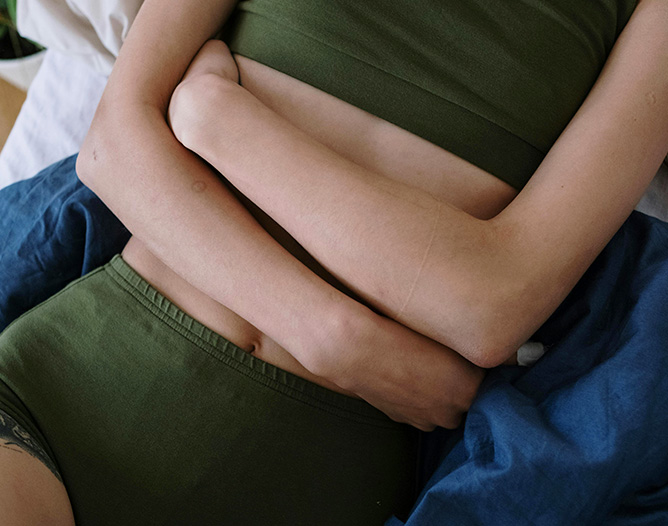Quick Links
PCOS can be a difficult diagnosis for many women as it can cause infertility, excess body hair, acne, and weight gain. But with proper treatment, you can get the relief you deserve and live a full life. Our team at MAIA will build a customized PCOS treatment plan that addresses all your concerns.
What is PCOS?
Polycystic ovary syndrome (PCOS) is a condition in which the ovaries produce an abnormal amount of androgens (male sex hormones). While women produce androgens, it’s usually in small amounts, but with PCOS, the amount is much higher than normal. Additionally, small cysts form along the edge of the ovaries, although some women who have PCOS do not have any cysts. The small follicle cysts contain immature eggs and fluid.
PCOS is one of the most common causes of infertility in women and people assigned female at birth. It can also increase your risk of other health conditions, which is why treatment is so crucial.

What Causes PCOS?
The exact cause of PCOS is unclear, but there are a few factors that have been more commonly found in those who have PCOS over those who don’t. First, it may be hereditary. It’s common for mothers and daughters or sisters to have PCOS. Other risk factors for PCOS include:
Insulin Resistance: Many women with PCOS have insulin resistance. This means the body can’t use insulin correctly, and blood sugar levels increase. This can cause the body to create more insulin to bring down your blood sugar levels. With this much insulin in the body, it can cause the body to produce too much androgen and lead to PCOS.
Low-Grade Inflammation: Research has shown that people with PCOS have chronic low-grade inflammation that leads the ovaries to produce more androgens. It can also lead to heart and blood vessel problems in the long run. By testing the levels of C-reactive protein and white blood cells in the blood, we can see the level of inflammation in the body.
#1 GROUP OF GYNECOLOGISTS IN THE CHICAGO AREA!
Renowned Expertise
Dr. Wolowick and Dr. Mitchell are renowned for their exceptional expertise and dedication to patient care. Their comprehensive knowledge and innovative approaches have consistently led to outstanding treatment outcomes. Patients and colleagues alike deeply appreciate their commitment to advancing medical practice and improving patient well-being.
Meet The Team

What to Expect with PCOS
Some of the symptoms you can expect with PCOS include:
- Missed or irregular periods
- Excess body hair
- Weight gain around the belly
- Thinning hair or baldness
- Acne
- Cysts on the ovaries (although not always)
- Infertility
- Skin tags
Dark or thick skin patches on the back of the neck, in the armpits, and under the breasts
PCOS Treatment Options
Treatment for PCOS can depend on a number of factors, including your age, the severity of your symptoms, and your overall health. The type of treatment recommended can also depend on whether you want to become pregnant in the near future or not.
PCOS treatment typically focuses on managing symptoms rather than curing the disorder. This can include addressing weight gain, excessive hair, or infertility.
Lifestyle Changes
A change in diet and activity can help with weight loss and reduce symptoms. Changing your habits can also help your body use insulin more efficiently, lower blood glucose levels, and help with ovulation.
Medication
There are quite a few medications that are used to address the symptoms of PCOS. They include:
- Birth control pills: Combination oral contraceptive pills (with both estrogen and progestin) can help control your menstrual cycle, lower androgen levels, reduce hair growth, and reduce acne.
- Birth control patches, shots, or IUD: Hormonal birth control can regulate your menstrual cycle, improve acne, and reduce excess hair growth.
- Diabetes medication: Diabetes medication can help lower your insulin resistance. They have also been shown to be effective at reducing androgen levels, slowing hair growth, and ovulating more regularly.
- Progestin therapy: Taking progestin for 10 -14 days every 1 to 2 months can regulate your periods and protect against endometrial cancer.
- Spironolactone (Aldactone): This medication blocks the effects of androgen on the skin, including excessive hair growth and acne. This medication isn’t recommended if you’re pregnant or planning to become pregnant.
- Metformin: This type 2 diabetes medicine can improve insulin resistance and lower insulin levels.
- Eflornithine (Vaniqa): This topical cream can help slow the growth of facial hair.
To help ovulation and address infertility, there are a few different medication options available, including:
- Clomiphene. This oral anti-estrogen medication is taken during the first part of your menstrual cycle.
- Letrozole (Femara). This breast cancer treatment can work to stimulate the ovaries.
- Gonadotropins: This is a hormone medication given via an injection
Hair Removal
Laser hair removal and electrolysis can damage and then eliminate the follicle where the hair grows which can stop unwanted excess hair from growing on different areas of the body. Several treatment sessions may be necessary to fully eliminate all the hair.
Acne Treatments
There are also a number of medications, gels, and topical creams to help improve acne. You can talk to your provider about possible options that would be right for you.
Schedule A Consultation
Finally get some relief from your PCOS symptoms with the help of our team at MAIA! Dr. Wolowick and Dr. Mitchell will listen to your concerns, ask about your medical history, and build a tailored treatment plan to address all your concerns and symptoms. Take the first step toward better gynecological health today and schedule a consultation. Call our Downers Grove, IL office at 630-320-6703 or use our online contact form.
Our team at MAIA proudly serves the Chicago, Aurora, Naperville, and Downers Grove, IL communities.




